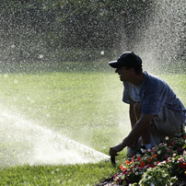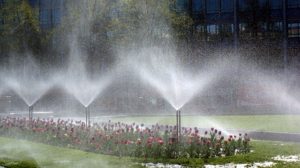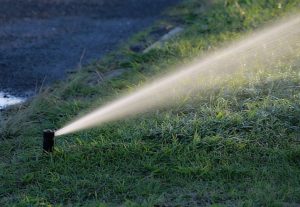
Considering the fact that the irrigation systems are specifically designed to be low maintenance, a lot of those who own a property think that it wouldn’t be of much harm to leave it as is. That’s not true at all because even the sturdiest equipment can eventually wear out. Furthermore, a periodic inspection throughout the irrigation season is a great way to prevent and reduce any possible issues. This means your lawn would look at its best with minimal care needed.
8 Tips for Maintaining Your Irrigation
1. Have a Water Audit
If possible, you should hire a Certified Landscape Irrigation Auditor who can give your property a complete water audit. This would cover the entire property, as well as the irrigation system’s reach. After which, you’ll be receiving a report that states where exactly the water is going, and if your irrigation system is operating efficiently
2. Have an Older Irrigation System Re-calibrated
Getting a sprinkler system retrofitted is a very good investment. Moisture sensors, nozzle upgrades, and smart technology work in hand to increase your system’s efficiency, which will save you a lot of money in the long run.
3. Pay Attention to the Irrigation Sprinkler Heads
This should be done, at a minimum every other week. Walk throughout your property and see if all the sprinkler heads are in good condition and working. Don’t worry; this isn’t difficult at all because most controllers have a test cycle. All you have to do is set the timer to have it “tested.” The timer would run for a couple of minutes for each zone. There will also be short pauses between zones that would allow you to check the heads that seem to be not working.
4. Make Sure the Heads Aren’t Broken
Due to the fact that sprinkler heads are hard to see, a head that isn’t retracting properly could accidentally get run over by a lawn mower. Additionally, if water is shooting up where the sprinkler head should be, then there’s a possibility that the head (or nozzle) is broken. Have this replaced immediately to prevent the problem from getting worse.
5. The Heads Should Not Be Clogged
Hard water is often the culprit of clogged rotor nozzles and sprinkler heads. The mineral, dirt, and mulch buildup may prevent the water from discharging properly. In order to prevent this from happening, you should check the screen inside the stem of the spray head, and clean it thoroughly. In case the orifice is plugged, you’ll probably need to push out the clogged matter using a screwdriver, awl, or similar tool similar. If this doesn’t work, then you should replace the head.
6. Consider Hydrozone Landscaping
For those whose landscapes aren’t divided into hydrozones yet, now is the perfect time for consideration. Have your irrigation system redesigned and reinstalled. Hydrozoning entails grouping plants together that should be watered equally. For instance, drought-tolerant plants shouldn’t be paired with annuals because they have different water needs.
7. Don’t Neglect Mulching
Mulching is important, because you wouldn’t use much water if your landscape beds are already mulched. The good thing about this is that, mulch is known for retaining moisture longer, giving the plants the nutrients and protection it needs.
8. Watering Should be Done in the Wee Hours of the Morning
It’s important that the irrigation times are set accordingly. Generally, set your timer so that your system operates between 2:00 am and 6:00 am. By doing this, your plants will benefit from getting water during the early hours because there’s usually less wind.
Guest writer for this month was Stephen Fox with Real Property Management in Indianapolis website. We encourage others looking to share information on our blog to send their interests to us for future consideration.



